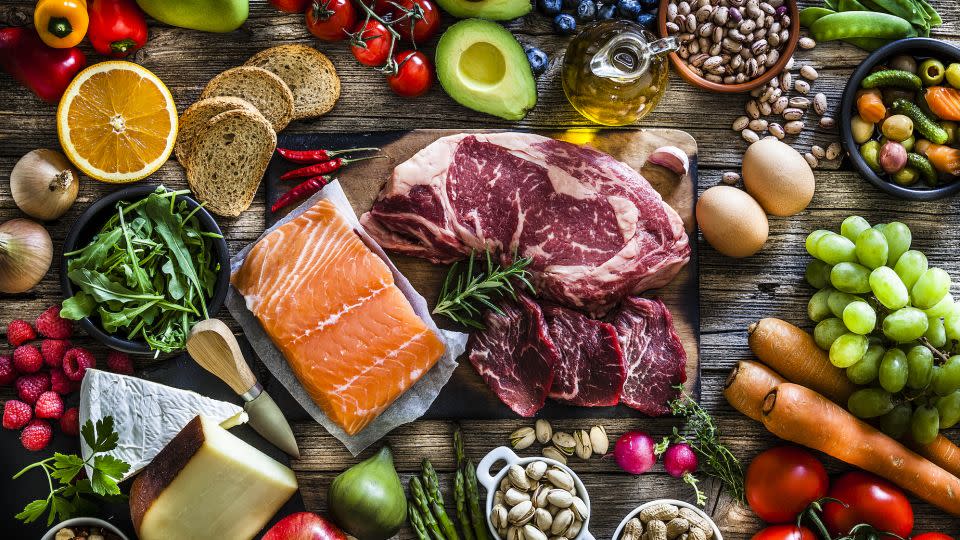Swapping processed meat for plant-based foods may cut diabetes and heart disease risk, new review finds

Get inspired by a weekly roundup on living well, made simple. Sign up for CNN’s Life, But Better newsletter for information and tools designed to improve your well-being.
Replacing animal-based food such as red and processed meat or eggs with plant-based options such as nuts or legumes may reduce the risk of developing heart disease and type 2 diabetes, a comprehensive review has found.
The review, published November 16 in the journal BMC Medicine, analyzed the results from 37 earlier studies, and its findings “emphasize the potential health advantages of incorporating more plant-based foods into the diet,” Sabrina Schlesinger, head of the systematic reviews research group at the German Diabetes Center in Düsseldorf, told CNN.
Schlesinger, who was the paper’s senior author, and researchers from several German institutions collaborated on this paper which, they say, is the first systematic review to focus on a wide range of health outcomes that are associated with swapping out animal-based food for plant-based food.
Registered dietician Duane Mellor, a senior teaching fellow at the Aston Medical School in Birmingham, UK, told CNN that this review “fits with the pattern” of “a bigger collection of information that shapes our dietary guidelines.”
“It’s adding to the picture that we are already fairly comfortable with,” added Mellor, who wasn’t involved in this research.
Previous studies have already indicated some health benefits from plant-based diets. A May study found that total cholesterol declined 7% for people following a plant-based diet when compared with those who eat both meat and plants, while an August 2019 study suggested that eating more plants and less meat was tied to longer life and a reduced risk of cardiovascular disease.
This latest review observed a 27% reduction in the overall incidence of heart disease when 50 grams (1.8 ounces) of processed meat per day was swapped with 28 grams to 50 grams (1 ounce to 1.8 ounces) of nuts per day, and a 23% reduction when the meat was swapped with the same amount of legumes.
A 22% reduction in the incidence of type 2 diabetes was also associated with swapping 50 grams of processed meat per day with 10 grams to 28 grams of nuts per day.
Replacing butter with olive oil, and eggs with nuts, also indicated a reduced risk of developing type 2 diabetes and heart disease, though replacing other dairy products, fish, seafood or poultry had no clear association with a lower incidence of heart disease, the review found.
The findings in the new research “do not rely on the results of a single study but systematically summarize all available evidence on the topic,” said Schlesinger, adding this was the main strength of the review.
While such an approach hasn’t produced “entirely novel” findings, she noted the “consistency” of results from previous studies, indicating “a robust level of confidence in the effect estimate.”
The review only observes the association and neither shows a causal link nor investigates whether there is one, but it offers some possible reasons for these trends in the data.
Processed meat, defined by the World Health Organization as having undergone salting, curing, fermenting, smoking or other processes to make products such as sausages, ham or canned meat, contains saturated fatty acids, which potentially increase the risk of heart disease and type 2 diabetes.
Meanwhile, nuts, legumes and whole grains contain antioxidant and anti-inflammatory compounds that seem to reduce inflammation.
The study also posits an alternative explanation for the apparent health benefits — that people favoring plant-based foods are already likely to be following a healthier lifestyle in general and, although studies were adjusted to account for participants’ exercise, smoking, alcohol and eating habits, this effect cannot be ruled out.
“We can use this as part of a piece of information,” Mellor said, “but we need to use it with intervention studies … to work out why they might be showing that effect.”
How can you use this review to inform your diet?
Simply switching animal-based products for plant-based products doesn’t automatically result in a healthy diet. The outcome depends on the products being swapped in.
“We need to be cautious about words like plant-based, which can be used by food manufacturers,” Mellor said. “After all, a bag of sugar is plant-based, and it’s (the study is) not meaning that.”
The US Department of Agriculture recommends making half your plate fruits and vegetables, varying your vegetables and protein, making half your grains whole grains. The federal agency also advises choosing foods and beverages with less added sugar, saturated fat and sodium.
As well as considering the health benefits of different food, it is important to take culinary and cultural perspectives into account when making these swaps, Mellor said.
“Just because the statistics say a swap reduces risk, does it make culinary and cultural sense? And if it doesn’t, it is not likely to work as advice,” he said.
“So swap lentils for processed red meat because you can make a sausage out of lentils … that would make sense, but swapping in some carrots and some broccoli for red meat doesn’t make sense.”
Anyone considering becoming a vegetarian or vegan should also be sure their diet is carefully planned to include enough iron, iodine, vitamin B12 and vitamin D, Mellor told CNN in May.
For more CNN news and newsletters create an account at CNN.com


